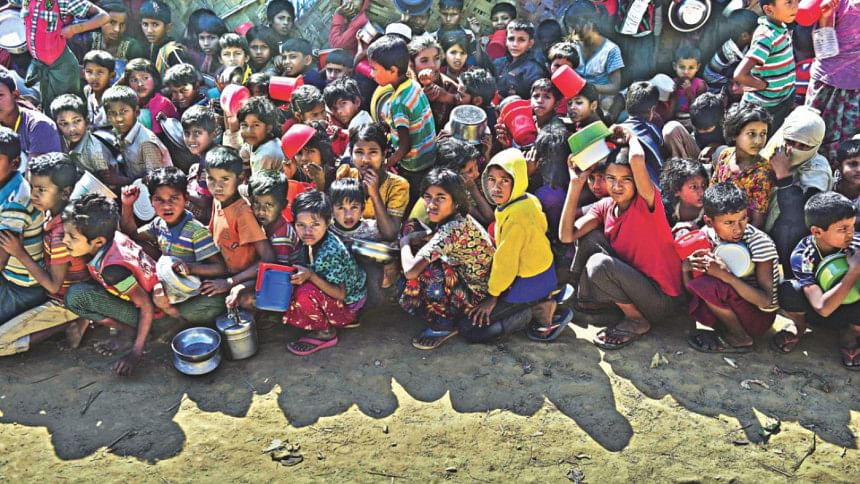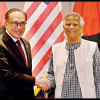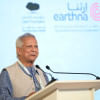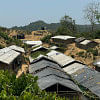The uncertainty continues

The Myanmar junta, under the façade of a democratically installed government headed by a titular political icon Aung San Suu Kyi, has been carrying out a campaign of brutal ethnic cleansing of Rohingya Muslim minority in its Rakhine province with complete impunity even though the world community is keenly aware of the atrocities and flagrant human rights violations perpetrated on this million-strong ethnic group. The Rohingyas, as an ethnic group today, are mostly scattered around Asia, bulk of them in Bangladesh that shares a patch of common border with Myanmar on its west.
Aung San Suu Kyi is no less than a Nobel Peace laureate having suffered house arrest at the hands of the same junta that has allowed her to take the lead of a democratically elected government as the "state counsellor" while forcing her to delegate the role of the president to her loyal party protégé Htin Kyaw who once reportedly chauffeured her around. In this theatre of absurdity, the real levers of power are of course retained by the head of the military in the person of Senior General Min Aung Hlaing. Emboldened by a supportive Chinese regime and an obsequious Indian government, Myanmar's military and paramilitary forces, under General Min's direction, have unleashed a mayhem of murder, rape and plunder on the Rohingya minority with mindless barbarity and ostentatious cruelty such as throwing live Rohingya babies into pyres of burning houses set on fire by the marauding military thugs.
Every single day, for more than a hundred days late last year, thousands of Rohingya refugees fled from the ferocious Myanmar military assault leaving behind their own homes and community and entering the neighbouring Bangladesh either on foot, trekking across miles of undulating and treacherous land negotiating hidden mines planted by the Myanmar military, or on boats over the rough waters of the Bay of Bengal that churn and heave during the monsoon rains.
In total more than 700,000 Rohingya refugees have already taken shelter in Teknaf and Cox's Bazar districts of Bangladesh in the last few months on top of more than 400,000 already residing in existing UNHCR refugee camps that were set up more than a decade ago. Over a million and counting—such mass exodus of refugees has not been seen anywhere in the world in recent times.
The UN along with some western countries with deep pockets have committed resources amounting to several hundred million dollars to help feed and house the refugees now living in sub-human conditions. But more heartening are the small acts of generosity of the common populace of Bangladesh who have embraced with open arms the helpless refugees fleeing the horror of ethnic cleansing by the Myanmar junta and helped the Rohingyas with whatever little Bangladeshis have to offer to assuage their suffering.
On November 23 last year, the governments of Myanmar and Bangladesh signed an agreement for repatriation of Rohingya refugees. However, critical questions remain as to the sincerity of the Myanmar government in taking back the Rohingya refugees who are bona fide citizens of Myanmar but denied the privileges of citizenship for their ethnicity. For one, most of the refugees have no identification papers as the armed junta burned all their papers and belongings before pushing them towards the Bangladesh border.
Secondly, even if they are allowed to go back there is no guarantee that they will be allowed to resettle on their own lands and homesteads. If the past is any indication such repatriated Rohingyas have been forced to live in camps inside Myanmar adding insult to injury.
Thirdly, the pace of agreed repatriation, according to some media outlets familiar with the terms of the agreement, is a measly 1,500 every week. At that rate it will take—now get this—almost 10 years to repatriate all the Rohingyas displaced to Bangladesh since October 2016! If that is a joke then it's a very poor one; if it's a minimal commitment from the Myanmar government to be increased in due course then it's a fools' agreement for the Bangladesh side.
In the meantime the Rohingya camps have become a cesspool of communicable diseases with more than a million refugees living in tight-knit tent dwellings in an area measuring around 3,000 acres—that means 1.2 million people in around 12 square km or 100,000 people per square km! That is a stupendous number when you factor in the fact that all dwellings in the Rohingya camps are single-storey shacks. Social workers and volunteers from more than a hundred non-government organisations (NGOs) and the government brave innumerable odds while providing the much-needed succour to malnourished children and the sick under the constant threat of catching a disease that could be fatal. These camps are certainly not sustainable for such a large number of destitute refugees and they are a ticking time bomb for epidemic-scale communicable disease outbreak that would be extremely difficult to contain in a country that already has the highest density of population in the world leaving aside city states such as Singapore.
The question thus remains: what will become of these refugees? Will they become permanently stateless like the Palestinian diaspora displaced by the Arab-Israeli war of 1967 or the ethnic Biharis living in camps since Bangladesh's war of independence in 1971? Is this a joke on the Rohingyas, or all of humanity?
Habibullah N Karim is an author, policy activist, investor and serial entrepreneur. He is a founder and former president of BASIS and founder/CEO of Technohaven Company Ltd.
Email: [email protected]










Comments